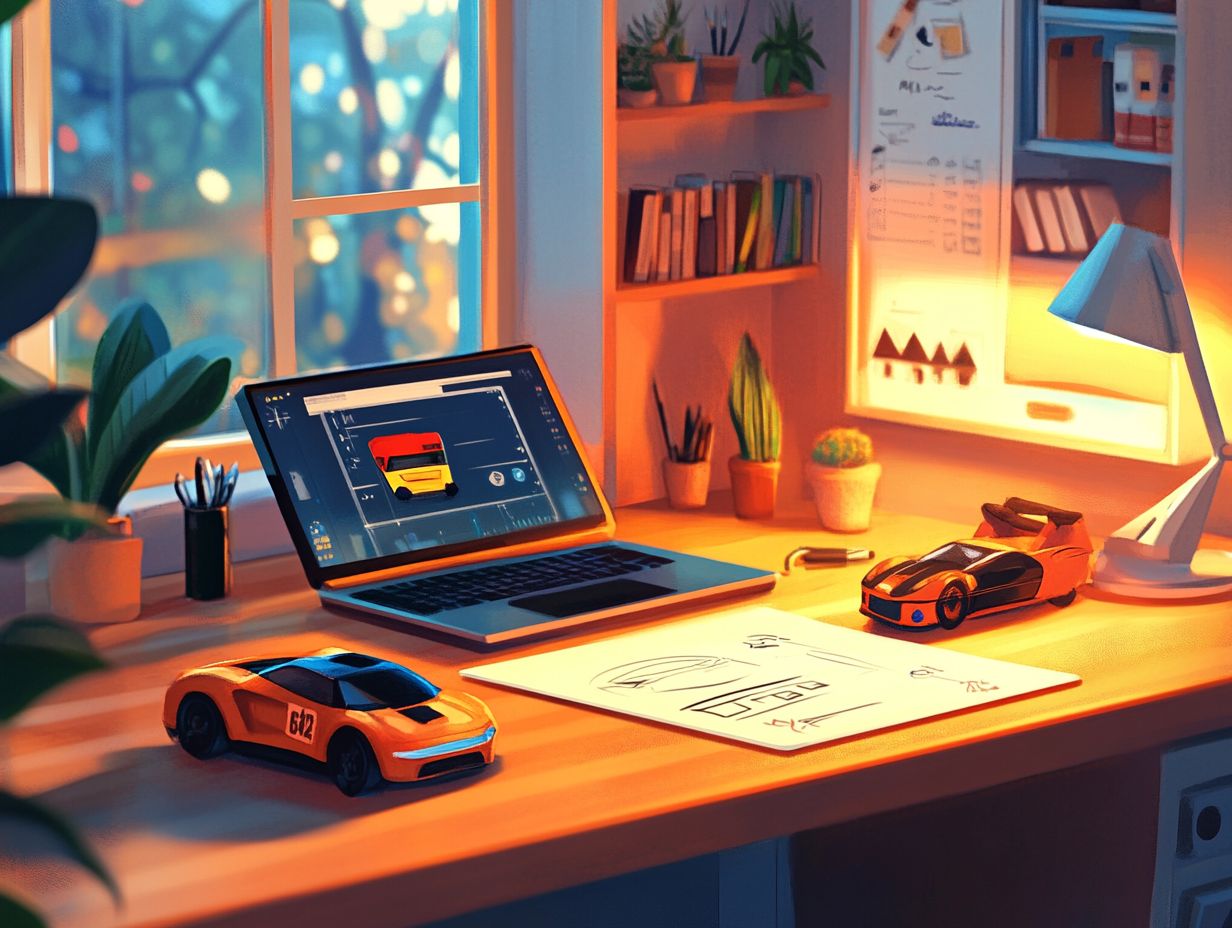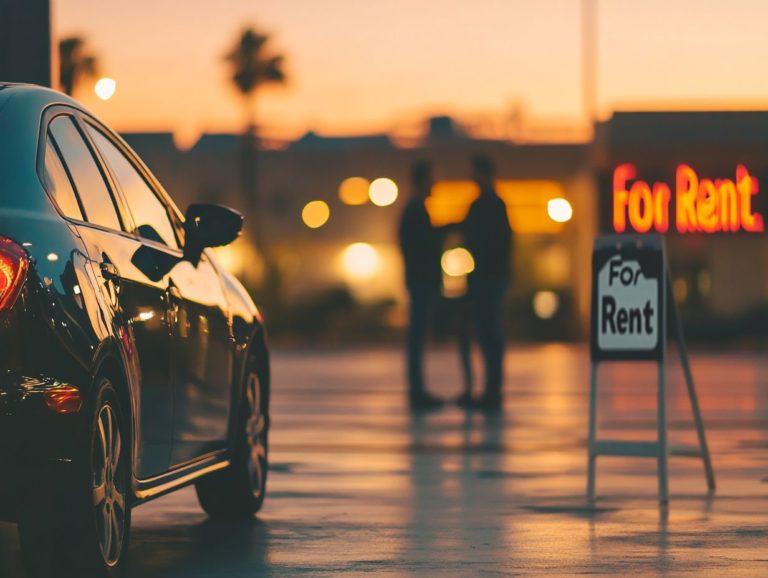Can You Insure a Car You Don’t Own?
Want to drive with confidence? Understanding car insurance ownership is key for every driver. It covers various aspects, like your connection to the vehicle and how it affects your insurance policy.
Liability and collision coverage are critical components that can change based on your insurance provider and state laws.
Contents
- Key Takeaways:
- Understanding Car Insurance Ownership
- Insuring a Car You Don’t Own
- Options for Insuring a Non-Owned Car
- Factors to Consider Before Insuring a Non-Owned Car
- Frequently Asked Questions
- Can You Insure a Car You Don t Own?
- Why Would I Need to Insure a Car I Don t Own?
- What Does a Non-Owner Car Insurance Policy Cover?
- Can I Add Additional Coverage to a Non-Owner Car Insurance Policy?
- How Much Does Non-Owner Car Insurance Cost?
- Do I Still Need Non-Owner Car Insurance If the Car I Drive Is Already Insured?
Key Takeaways:

- You can insure a car you don t own, but keep in mind that rules can differ by state and insurance company.
- Non-owner car insurance and adding the car to an existing policy are two options for insuring a non-owned car, but they may have different coverage and cost implications.
- Before insuring a non-owned car, consider insurance requirements, restrictions, and potential costs and benefits to determine the best option for your situation.
Understanding Car Insurance Ownership
Understanding car insurance ownership is essential for anyone who drives or intends to drive a vehicle. It involves comprehending various aspects, including the relationship between the registered owner, your financial stake in the vehicle, and how these elements tie into an insurance policy.
Liability coverage and collision coverage are important factors in determining your insurance terms, and they can vary depending on your insurance provider and state laws. Therefore, it’s crucial to recognize how ownership affects your coverage options and the responsibilities that come with being a vehicle owner.
Defining Ownership and Insurance Coverage
Ownership in car insurance pertains to the legal acknowledgment of you as the vehicle owner, establishing the insurable interest that is necessary to secure an insurance policy. This insurable interest means that you could face financial loss if your vehicle is damaged or totaled, underscoring the need for insurance protection.
It s vital to grasp the difference between vehicle owners and registered owners. As a vehicle owner, you possess the legal rights over the car, while a registered owner might simply be someone whose name appears on the title or registration.
Navigating your insurance coverage options is essential, as it encompasses a variety of forms, including liability, personal injury protection, and comprehensive coverage. Each of these is crafted to meet your specific needs and responsibilities as the owner, as well as any additional registered drivers.
Insuring a Car You Don’t Own
Insuring a car you don t own can indeed be intricate, often necessitating specific types of coverage, like non-owner insurance. This coverage is designed to protect you when you frequently drive borrowed cars whether it s a family member s vehicle, a friend s ride, or even a rental car you re using while traveling.
It s crucial to understand how liability coverage operates in these situations, as many insurance providers offer customized options that cater to a range of needs and circumstances. This is particularly relevant for caregivers who may find themselves needing to drive a vehicle not registered in their name.
Possible Scenarios and Considerations

There are various scenarios where non-owner insurance becomes essential. For example, when you’re driving a borrowed car from a family member or a friend’s vehicle, liability coverage is crucial. This protects both you and the vehicle owner.
This type of insurance is invaluable for those who frequently rent cars. It acts as a safety net against potential mishaps and ensures you aren t solely reliant on the rental company’s coverage. If you use different vehicles regularly, such as ridesharing services or company fleet cars, non-owner insurance can bridge the gap between personal and business use, providing critical liability protection.
Consult with your insurance provider today to discover your best coverage options! It s important to understand any limitations, like coverage limitations based on where you drive or specific vehicle types that could affect your coverage. Understanding these nuances gives you the power to make informed decisions about your insurance options.
Options for Insuring a Non-Owned Car
When it comes to insuring a non-owned car, you have several options available. One viable choice is non-owner car insurance, specifically crafted for those who don t own a vehicle but still need coverage.
You can also add the car to an existing policy. This offers flexibility in managing your coverage limits while ensuring that the registered owner remains well protected. Understanding these options is crucial for making informed decisions about your auto insurance.
Non-Owner Car Insurance
Non-owner car insurance is a specialized policy designed to provide liability coverage for those who frequently drive vehicles that aren t theirs. This type of insurance protects you against potential financial losses from accidents, making it ideal if you often rely on rental cars, borrow vehicles from friends or family, or use car-sharing services.
Typically, the policy includes essential coverage options like bodily injury liability (which pays for medical expenses of others if you cause an accident) and property damage liability (which covers repairs to someone else’s vehicle or property). Some non-owner policies might also offer medical payments coverage, protecting you and your passengers regardless of fault. Evaluate your personal circumstances when considering these options.
The primary advantages of this insurance are its affordability and easy access, especially for those who don’t drive regularly. However, be mindful that it may come with certain limitations, such as the lack of comprehensive and collision coverage, which could leave you vulnerable in more serious situations.
Adding the Car to an Existing Policy
Adding a non-owned car to your existing insurance policy can be a smart move, especially if you sometimes drive a friend’s or family member’s vehicle. This strategy allows you to adjust your coverage limits while ensuring the registered owner meets their insurance requirements.
This thoughtful approach addresses the needs of occasional drivers and shields you from potential liabilities that might arise from accidents or damages while using someone else’s car. By incorporating a non-owned vehicle into your policy, you can enhance your financial protection without facing significant additional costs.
It s essential to talk with your insurance provider to understand how coverage limits may change and what specific liabilities will be assumed by both you and the registered owner. Grasping these nuances helps avoid misunderstandings and ensures everyone is adequately protected in the event of an incident on the road.
Factors to Consider Before Insuring a Non-Owned Car

Before you insure a non-owned car, several essential factors come into play. First, review the insurance requirements set by your state.
It’s also important to look at the costs of non-owner insurance and the benefits each policy offers. Understanding these elements helps you make informed decisions and ensures adequate coverage.
Insurance Requirements and Restrictions
Insurance requirements for non-owner policies vary based on state laws and your insurance provider. Familiarize yourself with the relevant regulations to make informed choices.
Some states require minimum liability coverage levels (the least amount of insurance required by law). Others allow more flexibility in setting limits. Certain insurers may have unique rules, such as age restrictions or specific driver qualifications.
Explore how these laws can impact your coverage options to ensure you get the best deal. Consulting industry professionals can provide tailored insights, empowering you to make informed decisions about your non-owner policies.
Costs and Benefits of Insuring a Non-Owned Car
The costs and benefits of insuring a non-owned car shape your decision-making process. Factors like premium rates and coverage limits are crucial for evaluating your options.
The premium for non-owner insurance varies based on your driving history and the company you choose. It’s essential to compare multiple quotes to find the best fit. While the upfront cost may seem intimidating, the potential liabilities covered in an accident can give you peace of mind.
Key considerations include specific exclusions in the policy and the level of liability coverage. Think about adding extra protections like personal injury coverage. A thoughtful analysis will help you select a policy that aligns with your financial situation and driving habits.
Frequently Asked Questions
Can You Insure a Car You Don t Own?

Yes, you can insure a car you don t own. This is called a non-owner car insurance policy.
Why Would I Need to Insure a Car I Don t Own?
You may need this insurance if you often drive a car that belongs to someone else, like a friend or family member.
What Does a Non-Owner Car Insurance Policy Cover?
A non-owner car insurance policy typically covers liability, including bodily injury and property damage.
Can I Add Additional Coverage to a Non-Owner Car Insurance Policy?
Some companies offer extra coverage options for non-owner policies, like medical payments or uninsured/underinsured motorist coverage.
How Much Does Non-Owner Car Insurance Cost?
The cost varies based on your driving record, coverage limits, and the insurance company you choose.
Do I Still Need Non-Owner Car Insurance If the Car I Drive Is Already Insured?
Yes, it’s recommended to have non-owner insurance even if the car you drive is insured. It provides extra coverage and protects you if the owner’s insurance is insufficient.






